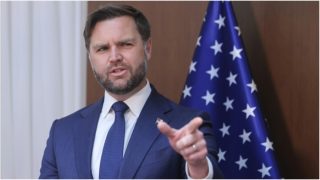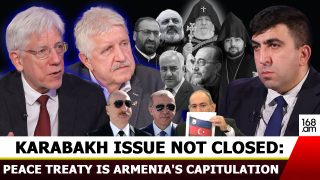Russia isn’t the Only Security Player in the South Caucasus: Emmanuel Dupuy

Interview with Emmanuel Dupuy, advisor to the Defense Minister of France, President of the Institute for Prospective and Security in Europe.
Mr. Dupuy, after membership to Eurasian Economic Union (EEU) was cooperation perspectives does Armenia have today and haven’t the EU positions weakened after Brexit?
The situation concerning the European Union (EU) and Armenia is entering a new phase, because as we all know and the president of Armenia met president Putin a few days ago. As we all know the next Yerevan summit of CSTO will take place in a few days and there is ongoing debate whether or not this will burden the relations between Armenia and EU, that is to say can the country be a part of two unions, because the Eurasian Economic Union (EEU) is precisely equivalent on the eastern part of the European continent and that is a juridical and a political question. Juridical question is simple—you cannot belong to two unions. Because the purpose of the union is to gather both on economic level, political level and of course, to dedicate a certain number of political measures, administrative integration and, of course, political, as well as security collective perception.
Then there is a political aspect of this. The EU has created the oriental partnership in 2009 precisely to raise and to have a bridging strategy with a certain number of countries, were not supposedly are at the state to enter the EU, as everyone knows the EU is in crisis, the Brexit after 24 June decision of Great Britain to go out of the EU, which will not be effective during the two next years on the paper, as we put an emphasis the ongoing legitimacy, efficiency, and we open the debate whether or not the EU should reassess its priority, redefine its outskirts, its sovereignty, that is to say with the ongoing debate whether or not it’s efficient and it’s pragmatic of meeting other countries into EU, as a certain number of countries may be willing to follow the British example. It’s precisely the case with a certain number of countries, and they may be attracted by the EEU. I’m speaking of some countries, which have said that they’re looking very actively to have relations on economic level regarding Brussels, as well as Moscow, maybe a country like Hungary is exemplary of that. So, there is the debate on what apparatus, what type of relations we take of administrative cooperative tool EU needs to create to use with its neighbors, as we redefine its neighborhood strategy.
In late November the high commissioner for external action Federica Mogherini made it clear that Europe has to rebuild, re-enhance, make more robust its relations with its neighbors and she added also with neighbors of neighbors, geographical neighbors, i.e. 6 countries of the oriental partnership and the neighbors here such as Kazakhstan , Central Asian states, which will definitely not be legitimate to enter the EU, but with which the EU has to have a strategy, because a certain number of subjects were to be touched upon together: energy independence, logic of mutual cooperation in regard to common friends in terrorism, separatism. So, Armenia is a good example of how the EU must reconsider its relations with its outskirts.
The practical idea is to say whether or not the EU must go bigger or must go better, and because the Brexit debate in my point of view has re-dimensioned the debate on redefining the essential motivation of the ownership on the reason why you want to enter the EU.
A certain number of countries have been very much eager to diminish, prohibit, or some have been very much liberal concerning the British. That is my first point of view. Secondly, definitely there is an interrogation on why the European Union has been created for? If it is for solidarity, then it has proven, that it’s not efficient, because some of the countries have proven their non-solidarity in regard to migrant crisis, economic crisis and the external crisis in Africa, in the Middle East. So this is the first reason why there may be EU, whether or not it’s effective, what does it provide as an answer—is it a collective security organization? –No, because it wasn’t created for that. But, nevertheless, there is a necessity to define how we can collaborate to have more security inside the Schengen zone or inside other countries.
The second question, which I think may be raised by the interrogation of Vladimir Putin when he speaks to his counterparts in Finland, in Hungary, in Poland or even with the Baltic countries is whether or not Europe has been defined in regard to Russia. That is the question that we maybe will be growing in the next years. That is to say, Europe isn’t containment strategy, it’s not a containment tool, created by accidental countries to contain Russian perspective. It’s not the tool of NATO. 31 countries of EU are members of NATO that we share the same strategy, we have the same feeling and perception in regard to Russian external policy and to defense and security agenda of Russian leadership.
Thirdly, there is definitely a crisis on how Europe can tackle the essential problems, the essential problems that it faces, i.e. assessing security for the all 7 million inhabitants of the EU and building the essential bricks to have sufficient weight to tackle the rest of the world. The EU is representing 24% of low GDP. ¼ of all of trade is inside the EU, i.e. if you take our British, the figures will diminish.
That is irrelevant, because you don’t have global, common, external and security policy, i.e. we have the tools, we have the evidence, we are the biggest bio-team power, with something like 25 million sq km of economic zone, you know 12 mile zone in front of each country, so we are the biggest neo-team nation, we are very strong research and development capability, but we don’t have the political will, we’re not putting the necessary political will to defend these two figures, i.e. we don’t have common military and security strategy and we’re not defending sufficiently, where the European factors of power are endangered, i.e. in after crisis in South Africa, what is, of course, what is happening in Libya or in the Middle East.
Armenian officials were grounding membership to EEU with existence of certain security issues as well. In your opinion, is Armenia’s choice justified, in particular, after the April war?
The question you’re asking me raises a lot of interrelation, because Vladimir Putin said to president Sargsyan a few days ago, when they met in Moscow, that the necessity to have close relations relies on the security agenda, of course, linked to a certain number of frozen crisis, which have been de-frozen a few months, a few weeks ago. But, I’m not sure that there is a reality to that, because we have seen the fact that the necessity to build peace in the South Caucasus relies not only on Russia, but also on the other countries, which are around the countries. Of course, I am speaking of Turkey, also Iran, which can play a major role and which said and proved that it is willing to mediate concerning the Karabakh crisis.
I’m not saying that Russia is irrelevant, I’m saying that Russia isn’t the only security player in the area. And this is precisely why it’s important, but again Vladimir Putin said to president Sargsyan a few days ago that it’s important to re-launch the mediation process concerning Karabakh, because not only Russia but the US, and France is the Co-Chair of the Minsk process.
So, the idea that Armenia should and is relevant to be a part of Eurasian community, because its security relies on its participation to see CSTO for example, it’s I think too radical as a response. It’s important to take into consideration that this area, south and north Caucasus, need stability and it cannot be only on relying on one actor. Of course, the new relations between Moscow and Ankara are of importance. It’s of utmost importance, because after the Georgian crisis in 2008 the two countries said they will be willing to work together, but it’s also important again after the common joint agreement concerning nuclear dilemma in Iran, signed in July 2015, but new players can also play that game.
By Gayane Khachatryan

























